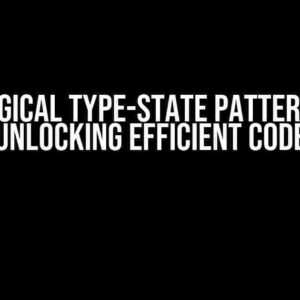Hey there, coding wizards! Are you tired of writing lengthy if-else statements to check if a KeyValuePair<string, int> contains a specific key in a Dictionary? Well, buckle up because we’re about to reveal the secret to doing it in just one line of code!
The Problem: Checking for a Specific Key in a Dictionary
Imagine you have a Dictionary that stores a collection of key-value pairs, where each key is a string and each value is an integer. You need to write a method that takes a key as an input and returns a boolean indicating whether the key exists in the Dictionary or not.
Dictionary<string, int> myDictionary = new Dictionary<string, int>()
{
{"apple", 1},
{"orange", 2},
{"banana", 3}
};
string keyToCheck = "orange";
bool keyExists = ???; // How do we check if the key exists in one line?
The Solution: Using the ContainsKey Method
The good news is that the Dictionary class provides a built-in method called ContainsKey, which does exactly what we need. This method takes a key as an input and returns a boolean indicating whether the key exists in the Dictionary or not.
bool keyExists = myDictionary.ContainsKey(keyToCheck);
That’s it! With just one line of code, we can check if a specific key exists in the Dictionary.
But Wait, There’s More: Using the TryGetValue Method
While the ContainsKey method is a straightforward solution, there’s another way to achieve the same result using the TryGetValue method. This method takes a key as an input and returns a boolean indicating whether the key exists in the Dictionary, along with the associated value.
int value;
bool keyExists = myDictionary.TryGetValue(keyToCheck, out value);
The TryGetValue method is useful when you need to retrieve the value associated with the key, in addition to checking if the key exists.
Key Differences: ContainsKey vs TryGetValue
So, when should you use ContainsKey and when should you use TryGetValue? Here’s a quick rundown of the key differences between the two methods:
| Method | Description | Return Value |
|---|---|---|
| ContainsKey | Checks if a key exists in the Dictionary | bool |
| TryGetValue | Checks if a key exists in the Dictionary and retrieves the associated value | bool, out value |
KeyValuePair<string, int> vs Dictionary<string, int>
Before we dive deeper, let’s clarify the difference between KeyValuePair<string, int> and Dictionary<string, int>.
- KeyValuePair<string, int>: A KeyValuePair is a single key-value pair that contains a string key and an integer value. It’s an individual element in a Dictionary.
- Dictionary<string, int>: A Dictionary is a collection of key-value pairs, where each key is a string and each value is an integer. It’s a container that holds multiple KeyValuePair elements.
Checking for a Specific Key in a KeyValuePair
Now, let’s address the original question: is there any way to check if a KeyValuePair<string, int> contains a specific key in one line?
The answer is yes! You can use the == operator to compare the key of the KeyValuePair with the specific key you’re looking for.
KeyValuePair<string, int> kvp = new KeyValuePair<string, int>("apple", 1);
string keyToCheck = "apple";
bool keyExists = kvp.Key == keyToCheck;
However, this approach is limited to checking a single KeyValuePair. If you need to check a collection of KeyValuePair elements, you should use a Dictionary instead.
Real-World Scenarios: When to Use Each
Here are some real-world scenarios to help you decide when to use KeyValuePair and when to use Dictionary:
-
KeyValuePair:
- When you need to store a single key-value pair.
- When you’re working with a data structure that requires individual key-value pairs, such as a LINQ query.
-
Dictionary:
- When you need to store a collection of key-value pairs.
- When you need to frequently lookup values by their keys.
- When you need to iterate over the key-value pairs.
Conclusion: Mastering KeyValuePair and Dictionary
In conclusion, checking if a KeyValuePair<string, int> contains a specific key in one line is possible, but it’s limited to a single key-value pair. When working with a collection of key-value pairs, it’s recommended to use a Dictionary instead. By understanding the differences between KeyValuePair and Dictionary, you can write more efficient and effective code.
Remember, the ContainsKey method and TryGetValue method are your friends when it comes to working with Dictionaries. With these tools in your toolkit, you’ll be able to tackle even the most challenging coding tasks with ease!
What’s your favorite way to work with KeyValuePair and Dictionary? Share your experiences and tips in the comments below!
Frequently Asked Question
Get the answers to your questions about checking if a KeyValuePair<string, int> contains a specific Key in a Dictionary in one line!
Is there a way to check if a KeyValuePair<string, int> contains a specific Key in a Dictionary using the Contains method?
Yes, you can use the Contains method, but it’s not the most efficient way. The Contains method checks for a specific KeyValuePair, not just the Key. For example: `myDictionary.Contains(new KeyValuePair
How can I check if a KeyValuePair<string, int> contains a specific Key in a Dictionary using the TryGetValue method?
You can use the TryGetValue method to check if a specific Key exists in the Dictionary. For example: `myDictionary.TryGetValue(key, out int value)`. This method has a time complexity of O(1), making it more efficient than the Contains method. If the Key exists, the method returns true and sets the `value` variable to the corresponding value.
Can I use LINQ to check if a KeyValuePair<string, int> contains a specific Key in a Dictionary?
Yes, you can use LINQ to check if a specific Key exists in the Dictionary. For example: `myDictionary.Any(kv => kv.Key == key)`. This method also has a time complexity of O(n), but it’s often more readable and concise.
Is there a way to check if a KeyValuePair<string, int> contains a specific Key in a Dictionary using a single line of code?
Yes, you can use the ContainsKey method, which is a single line of code and has a time complexity of O(1). For example: `myDictionary.ContainsKey(key)`. This method is the most efficient and concise way to check if a specific Key exists in the Dictionary.
What is the most efficient way to check if a KeyValuePair<string, int> contains a specific Key in a Dictionary?
The most efficient way is to use the ContainsKey method, which has a time complexity of O(1). This method is specifically designed for checking if a Key exists in the Dictionary, making it the fastest and most efficient way to do so.




